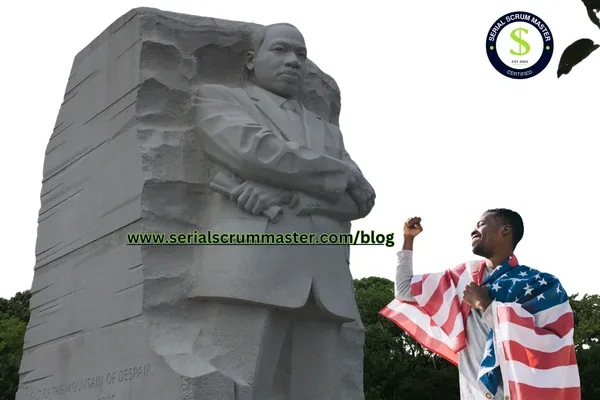
Agility in Action: How Scrum Principles Mirror the Dr. Martin Luther King, Jr. Initiative
Introduction
In today's fast-paced world, methodologies like Scrum and Agile are transforming how teams work to achieve their goals. However, these frameworks don't just apply to software development and project management; they are deeply rooted in principles that align with social change initiatives. The Dr. Martin Luther King, Jr. Initiative embodies ideals of justice, equality, and community, showcasing how collaboration and adaptability can drive transformative change. This blog post will explore the parallels between Agile methodologies and the powerful legacy of Dr. King, emphasizing how both advocate for progressive strategies and impactful teamwork.
LET US HELP YOU WITH SCRUM.... Apply today at https://www.serialscrummaster.com/about
1. The Core Principles of Agile and Scrum
Overview: Agile and Scrum prioritize flexibility, collaboration, and continuous improvement, making them ideal for navigating complex projects.
Key Principles Include:
• Customer Collaboration Over Contract Negotiation: Engaging stakeholders and community members for inclusive solutions.
• Responding to Change Over Following a Plan: Encouraging adaptability to meet the evolving needs of marginalized communities.
• Delivering Value Frequently: Regularly providing updates and results ensures transparency and fosters trust.
2. Dr. Martin Luther King, Jr. Initiative: A Vision for Change
Overview: The Dr. Martin Luther King, Jr. Initiative aims to cultivate leaders who embody Dr. King’s vision of justice, equality, and peace.
Core Values:
• Collaboration: Just as Agile encourages teamwork, Dr. King emphasized the importance of collective action and unity.
• Adaptability: Dr. King’s strategies evolved based on community needs and social contexts, echoing the Agile principle of flexibility.
• Continuous Improvement: The initiative focuses on empowering individuals and communities to reflect, learn, and grow together.
3. Collaboration: Building Communities Through Agile
Overview: Scrum thrives on collaborative efforts, aligning with Dr. King's belief in the power of community.
Best Practices:
1 Cross-Functional Teams: In Agile, teams come together from diverse backgrounds, much like the coalition of activists that Dr. King united for civil rights.
2 Regular Check-ins: Daily stand-ups in Scrum ensure everyone is aligned, similar to the strategy of holding community meetings to discuss progress and challenges.
4. Adaptability: Embracing Change for Progress
Overview: Both Scrum and Dr. King’s initiatives teach us that adaptability is crucial for meaningful change.
Examples:
• Iterative Reflection: Agile teams use retrospectives to assess their work, akin to how Dr. King and his followers reflected on their campaigns to adjust tactics as necessary.
• Empowering Voices: Scrum emphasizes the importance of ensuring every voice is heard, mirroring Dr. King’s dedication to amplifying the marginalized in society.
Conclusion
Scrum and Agile methodologies empower teams to navigate complexity with collaboration and adaptability, a philosophy echoed in the teachings of Dr. Martin Luther King, Jr. By embracing these values, individuals can foster transformative change in their communities, leading to a more just and equitable society. Both frameworks challenge us to reflect on our actions and adjust our strategies to meet the evolving demands of our world. Embrace agility in your work and life, inspired by the powerful legacy of Dr. King.
#Agile #Scrum #MartinLutherKingJr #Leadership #SocialChange #Collaboration
